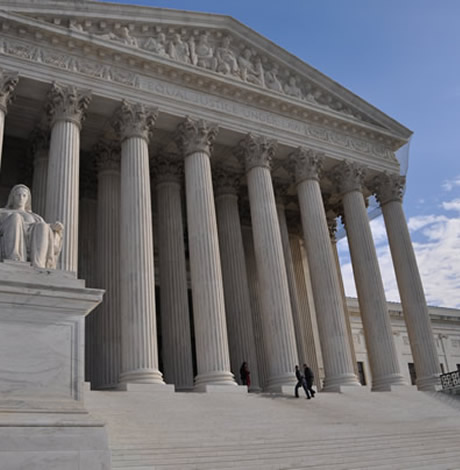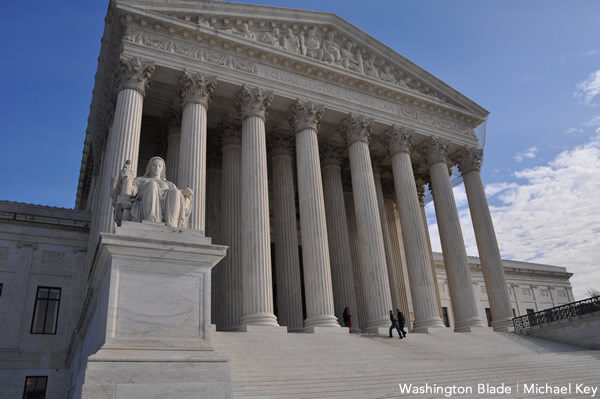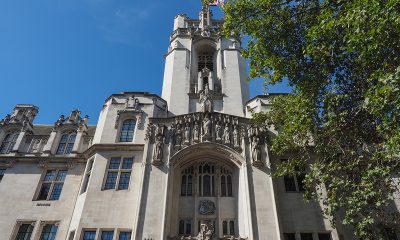Opinions
‘Because of sex’ approach to protecting trans people
Many analyses of Bostock decision missed the real history


“Here, I thought, looking around me, is where it all changed, because I was still too young to understand that history is not simply made up of moments of triumph strung together like pearls. I didn’t know that large changes were made up of many small ones, and of moments of suffering and backsliding and incremental, selective progress; unnecessary sacrifices and the opportunistic, privileged and lucky walking forward over the vulnerable and the dead.” —Carmen Maria Machado
The road to LGBTQ equality has been long and winding, made up, legally, of two paths — sex (gender) stereotyping and “because of . . . sex.” Until the Bostock decision last month we had a quantum mechanical, “Schrödinger’s Cat” causal conundrum — would the decision be based on “sex” as written in Title VII of the 1964 Civil Rights Act, or “sex stereotyping” as developed in the landmark 1989 Price Waterhouse v. Hopkins Supreme Court decision? Many guessed it would be the former, “because of . . . Gorsuch” and his penchant for textualism, but that didn’t stop plaintiff Aimee Stephens’ lawyer, David Cole, from arguing with the latter. Turns out it was the former, but before I trace the social history of that path, I would like to point out a delicious irony.
It’s long been understood that the modern Supreme Court rarely leads, and usually follows, public opinion. That opinion is shaped by the people, and primarily by the people’s activist corps. In the case of the gay rights movement, the people universally known through the 1960s as homosexuals became known in the 70s as gay people. Why? Because the “sex” in “homosexual” directed one’s gaze to sex acts, which is still what most Americans conjure in their minds when they hear the word “sex.” And since many were repelled by the thought of gay sex, it became evident a different, de-sexed, label was necessary.
Similarly with the trans community, which had been universally known as the transsexual community through the 1980s, and which de-sexed “transsexual” to “transgender” in the ‘90s (the first national trans rights group, founded by Riki Wilchins and Denise Norris in 1993, was called “Transexual Menace,” and the second, was the “National Transgender Advocacy Coalition,” in 1999), and then finally just the single syllable “trans” in the aughts, to match the single syllable, “gay.” Language matters. Just as Americans viewed homosexual people through the lens of their sex acts, they viewed transsexual people the same way, often reduced to sex workers and homicidal maniacs (“Dallas Buyer’s Club,” 2013 and Hitchcock’s classic, “Psycho,” 1960).
So, today, gay and trans individuals have their employment rights, and soon full protections with the Equality Act next year, because of a return to the modern source of those rights, the Civil Rights Act of 1964, and “because of . . . sex.” Not gender, but sex, and, refreshingly so, but devoid of any implications of sexual activity. Justice Gorsuch, interestingly, returned to using the archaic term “homosexual” throughout his opinion, but did not revert to “transsexual,” and treated Ms. Stephens respectfully in his comments.
How did we get here? In the weeks following the decision many of the analyses of the decision missed the real history. That history is written by the victors, but it also very much matters which victors do the writing.
The path of “because of . . .” and “but for” sex began in the 60s, as Justice Gorsuch mentioned: Not long after the law’s passage, gay and transgender employees began filing Title VII complaints, so at least some people foresaw this potential application.
Trans persons won some lower court decisions in the ‘70s, before the religious and feminist backlash began in 1979 with Janice Raymond and then the Reaganites. Trans plaintiffs lost in the late ‘70s and ‘80s because transsexualism was not recognized as a form of sex (Holloway v. Arthur Andersen, 1977, Sommers v. Budget Marketing, 1982 and Ulane v. United Airlines, 1984). And then, in 1989, came Price Waterhouse v. Hopkins, and the landscape utterly changed for trans plaintiffs.
The first, and until Bostock, only SCOTUS decision (and victory) for a trans plaintiff occurred in 1994, in a unanimous Eighth Amendment decision written by Justice Souter on behalf of the plaintiff, a black trans woman, Dee Farmer. The next federal appeals court case, and the first in a string of victories leading to Bostock, was Smith v. City of Salem in 2004, won on both sex and sex stereotyping concerns, followed by another Sixth Circuit case, Barnes v. City of Cincinnati in 2005. Philecia Barnes was also a black trans woman and she won “because of sex.” The only hiccup in this long chain of victories was Etistty v. Utah Transit Authority in the 10th Circuit in 2007. This was followed in rapid succession by the blockbusters: Schroer v. Billington, 2008; Glenn v. Brumby, 2011; and Macy v. Holder, 2012.
It was the unanimous Macy decision at the EEOC, led by Commissioner Chai Feldblum, that protected trans persons in all 50 states, and cemented the “because of sex” approach to protecting trans persons. Professor Feldblum, a major author of the 1991 Americans with Disabilities Act (ADA), had been living in Takoma Park, Md., in Montgomery County in 2007-08 when I led the campaign for Basic Rights Montgomery to pass and defend the county gender identity law. That law generated the first bathroom bill backlash in the United States, and Professor Feldblum, who had been a believer in the doctrine that trans status was a function of sex and, therefore, covered by Title VII, was further encouraged to pursue it if she ever got her chance in the federal government to make it a reality. Presciently, these were her words 20 years ago: “But a strict textualist approach might work as well (or even better) for those seeking to achieve broad protection for gay people and transgender people. Under such an approach, the intent of the enacting Congress (or state legislature) is not as important as the words the legislature chose to use.”
It had been obvious to me, as well, as I had been teaching and lobbying for years on the medical basis of transsexualism being rooted in brain sex. Research begun in 1995 had been making that very plain. But few LGBTQ attorneys, with the notable exception of Katie Eyer, believed in the possibility of progressive textualism, even though the Constitution is the product of the Enlightenment.
So after being nominated by President Obama to the Equal Employment Opportunity Commission (EEOC) and confirmed by the Senate, Professor Feldblum looked for the right case and found it in Mia Macy. She then did the same for David Baldwin in the first national gay rights victory, Baldwin v. Foxx, in 2015.
Just looking at these cases it was clear that the federal courts (and some state courts as well) were beginning to respect trans persons enough, including black trans women, beginning in the ‘90s to not only not summarily throw them out of court, but to seriously apply the “because of sex” and sex stereotyping arguments to them. All that at a time when fewer than 8% of Americans (in a 2013 poll) admitted to knowing a trans person; when gay people, far better represented in the media and known in their communities, were routinely failing in federal court. Yet there have been post-Bostock analyses by highly respected civil rights lawyers that turn this history on its head. For example, Shannon Minter, the trans attorney for the National Center for Lesbian Rights (NCLR), said: “We’ve always known that our legal arguments are strong and should be accepted, but the reason it took decades for the courts to accept these arguments was because transgender people were so foreign to the courts.”
This is not the first time. After promoting the trans legal case “because of sex” for years, I tried to get the national LGBTQ, and particularly trans, organizations to recognize our success post-Macy. They would have none of it. The lawyers at HRC, the National LGBT Task Force, and even NCTE, the National Center for Transgender Equality on whose board I sat, refused to acknowledge the breakthroughs. To get the word out I had to publish a pamphlet, with attorney Jillian Weiss and activist Riki Wilchins, which was promoted by Masen Davis and the Transgender Law Center, the only nationally oriented trans group willing to get on board. We were also supported by Tico Almeida and Freedom to Work.
Fortunately, thousands of trans persons got the message, and filed claims with the EEOC. Many won, with most settling out of court because, you know, the law matters. Yet others have lived the past eight years in fear and anxiety because our institutions’ lawyers repeatedly said that we had no protections without a decision of the Supreme Court. I countered that it would take years, or might never happen because we were winning all our cases, and without a split at the appeals court level the Court might not even take up the issue. Fortunately for us today, SCOTUS rolled us into the Circuit split on the gay rights cases (Bostock and Zarda), and we pulled the gay community along to victory. No gays left behind. We had not lost a Circuit Appeals case since 2007, the only one in the 21st century, so I, for one, was not surprised.
People who are committing themselves to activism need to understand the history so as to most effectively pursue their goals in the future. LGBTQ folks need to understand the bureaucratic resistance within their own movements, from the most well-meaning people. It is, indeed, always a long and winding road to liberty and equality.
Dana Beyer is a longtime D.C.-based advocate for transgender equality.

There can be no other word than “insanity” for how the felon in the White House, along with his Nazi sympathizing co-president, are handling things. They are living in an alternative universe where they think they are a king and an emperor. They are happily screwing the American people, while creating havoc in the world. If the courts don’t stop them, and I am beginning to lose confidence in the Supreme Court, only Congress, if its members grow some cajónes, or the American people with their votes, will be able to eventually do it.
As I have written, Democrats will have to appeal to people at the local level district-by-district, to win. There have been discussions online about who the Democrats will put up in 2028. My view of those discussions are they are a waste of time. Debating whether it will be Booker or Buttigieg, and I am getting fundraising appeals from both, or someone else, is totally useless unless Democrats can win this year in New Jersey and Virginia, and then take back at least the House of Representatives in 2026. If Democrats can’t do that, it may not matter who our candidate is in 2028.
I recently went to a meeting to hear David Hogg, one of the new vice chairs of the DNC. He is a great young speaker. One suggestion I had for the DNC was they call out Sen. Bernie Sanders, an independent, when he suggests people can vote for a third party. There are very few districts in the nation where a third party has a chance in hell of winning. What they do, as we have seen over and over again, is to help Republicans.
Since Trump won, the list of those he is screwing keeps growing. Today it includes veterans, farmers, teachers, and students. He and his Cabinet have ended programs that helped protect African Americans, the LGBTQ community, women, Latinos, and poor people. He has stopped progress on cancer research, HIV/AIDS research, and fired people who help predict our weather. He fired, and then had to rehire, thousands of people fired by accident, and those the courts forced the administration to rehire.
Today in the United States we have a measles outbreak, with the first children in decades, dying from it. This because the man Trump has as his secretary of Health and Human Services speaks against vaccines. Now that a-hole is trying to have fluoride removed from our water, based on one study that says twice the amount we actually use, could cause problems. He recently did admit the MMR vaccine can actually prevent measles, and now suggests potentially using it.
Veterans are being fired from civilian jobs in the Pentagon, Veterans Administration, and other agencies. When asked about the firings, Alina Habba, a counselor to the president, had a dismissive response. “Without providing any evidence, Habba claimed that some who served in the U.S. military and went on to take government service jobs were not doing the work.” She wasn’t contradicted by anyone in the administration, or Congress. So, I would question why any veteran would ever again support Trump, or any of his acolytes.
As Trump moves forward with tariffs, we will see who gets screwed the worst. He paused them for 90 days because business leaders, who supported him, began to question his ideas. “Billionaire investor Bill Ackman, a rare critic among U.S. President Donald Trump’s top supporters, has voiced concerns over the president’s tariff strategy, and voiced, ‘this is not what we voted for.’”
Then came the first, if tepid, sign of some Republican senators taking their lips off Trump’s ass long enough to do their job. It was reported, “signs of GOP wariness emerged Thursday. Republican Sen. Chuck Grassley of Iowa teamed up with Democratic Sen. Maria Cantwell of Washington on a bill that would require the president to give 48 hours’ notice to Congress ahead of his imposition of tariffs, and those tariffs would expire after 60 days unless Congress approves them. The bill, called the Trade Review Act of 2025, was an amendment to a section of the Trade Act of 1974.” Then the bond market began collapsing and even Trump’s Treasury Secretary took notice.
Every day we wake up to another egregious thing the president has done, or wants to do. He sees himself as a dictator and is only interested in what he can do to wreak vengeance on anyone not willing to genuflect before him. My hope is people stop genuflecting, and instead, tell him to go f—k himself.
Peter Rosenstein is a longtime LGBTQ rights and Democratic Party activist.
Opinions
Fired. Depressed. Moved to Canada: Tales from Trump 2.0
We must not normalize what’s happening to our country

It’s been difficult to keep up with the news since Jan. 20, as the attacks on our community keep coming. The same president who nominated the highest-ranking openly gay government official ever (Scott Bessent as Treasury Secretary) is the same president who is killing transgender Americans via his incessantly cruel attacks on their humanity. (When you deny someone access to the bathroom, you deny their humanity.)
I have struggled to organize my thoughts about Trump 2.0. Instead, I am sharing anonymized anecdotes from people I know and love who have been adversely impacted by his cruelty. This is just a sampling of what Trump has wrought in barely three months.
• A close friend with a transgender child abruptly packed up and left the country, driving to Canada. I had no idea until a cryptic social media post prompted me to call. Their trans child no longer felt safe in our country. My friend sold the family home, packed the car, and drove to Canada. My heart breaks for their beautiful family, now geographically separated because of Trump’s attacks.
• Another friend in a high-ranking job was singled out by the MAGA social media mob. She was derided as a “DEI hire” simply because she’s a lesbian. The FBI came to her home and advised building a panic room. She now travels with armed security, something she never had to do before Trump.
• A friend was offered a job by a major news outlet. The offer was rescinded after their boss discovered a nearly 10-year-old blog post they wrote that was critical of Trump. Yes, the mainstream media are caving to Trump’s threats.
• Yet another friend in a senior civilian government post has been forced to fire longtime employees and remove any mention of the LGBTQ community (to which he belongs) from a government website. This includes important studies on LGBTQ health and wellness.
• And another friend who was fired from her federal government job is struggling with depression, unable so far to find a new job after a career in public service that ended with a dismissal for no reason.
Welcome to MAGA’s America, where public servants are ridiculed, threatened, and fired. Where mothers and fathers of transgender children are fleeing the country because their child fears being killed here. Where hard-working business leaders who happen to be LGBTQ or women or Black are targeted and doxed by Trump’s brainwashed, bigoted followers. Where one-time corporate “allies” are running like cowards from their DEI programming and support for the LGBTQ community.
At the Blade, I have fielded multiple requests from sources asking that their names be removed from past news articles because they fear government retaliation merely for being publicly identified as LGBTQ. We’ve never needed a formal policy for such requests until Trump returned to power. After consulting with experts in journalism ethics, we have decided to take such requests on a case-by-case basis. We have a unique contract with our readers, very different from mainstream outlets like the Washington Post, and will find a workable solution as these questions arise.
So now what? Those of us in a position to resist must do so. We must not normalize what’s happening to our country. Firebombing a governor’s residence; storming the U.S. Capitol; plotting to kidnap Democratic governors — none of this is normal or “OK,” as Pennsylvania Gov. Josh Shapiro said in a major understatement last weekend.
Join the growing protest movement around the country. Call and write to your elected representatives urging them to oppose Trump’s agenda, from his stupidly reckless tariff policies to his anti-trans attacks. Attend local town halls with elected officials and denounce the mass firings of federal workers. Read and donate to your local media outlets doing their best to cover all of these attacks on democracy.
And, perhaps most crucially, do what you can to support Democratic candidates running in the 2026 midterms. Our only hope of saving American democracy and the Constitution may be for Democrats to retake one or both houses of Congress next year. The Republicans have a narrow 220-213 majority. Last week, the Democratic Congressional Campaign Committee highlighted 35 GOP-held districts it is targeting in 2026; they only need to flip seven of those. The Senate will be a bigger challenge, though not impossible, as Democrats would need to flip four seats to take control. They have a good shot in Maine and North Carolina. With Trump’s plummeting approval ratings and an economy headed for recession, the Alaska and Ohio Senate races could also be competitive.
Stay engaged and informed. Reach out to friends who’ve lost their jobs to Elon Musk’s craven chainsaw approach to gutting the federal government. Do what you can to support and reassure the trans community that we have their backs. We know better than anyone that silence equals death. So find your voice and speak out.
Kevin Naff is editor of the Washington Blade. Reach him at [email protected].
Opinions
Keir Starmer has blood on his hands
British prime minister’s foreign assistance cuts will kill people with HIV

My name is Mijan. I’m a born and bred East Londoner, a child of immigrants, an ACT UP London/UK activist, and I live with HIV. ACT UP UK and our kin across the pond, ACT UP US, was founded to fight and champion rights of people living with and affected by HIV/AIDS. We are a global coalition that believes in Fund Healthcare Not Warfare, a transatlantic movement that demands global health justice and an end to military prioritisation over the health and wellbeing of human life. The threats we face are the same from funding cuts, state suppression, and queer erasure. U.S. or the U.K. we sing from the same hymn sheet: We will not stand by while our lives are at risk.
On April 8, eight of us ACT UP Activists disrupted Prime Minister Keir Starmer’s Liaison Committee. We were peaceful and determined to execute our die-in. Security was almost as determined to make sure we didn’t. They strong-armed us out of parliament like we were a threat. We tried to begin our die-in, to make a statement for the lives at stake, but instead we were rammed out the revolving doors as we were leaving, which they ended up jamming and dumped on the stairs of Portcullis House. We made the best of a bad situation and laid on the dirty grounds — because this is what democracy looks like in the U.K. when it’s under attack.
Why were we there? Because we are scared and angry. Because we are regressing. Because AIDS cuts means death.
Keir Starmer’s Labour government is enacting the most drastic reduction in U.K. AID cuts we have seen in many years, slashing it from 0.5 percent of gross national income to 0.3 percent by 2027. This is the lowest level of Official Development Assistance spending in years — and it’s being justified to increase defense spending. More missiles, fewer medicines. More tanks, fewer treatments.
Starmer, you justify this under the guise of “security” — but whose security are you protecting? It’s not mine. I live with HIV, and I’m only alive today because of global health funding, funding that made treatment, programs, and vital research possible. Thanks to that support, HIV is no longer a death sentence for many of us. But that’s not the case for everyone.
Not everyone has the privilege of being born in countries like the U.K., where treatment is accessible and free. Many will die because of funding cuts. Many will lose loved ones. We will see HIV contraction rates rise. We will see preventable deaths increase.
Kier, what you are doing is wrong! What you are doing is horrible! What you are doing is deadly!
Don’t take my word for it. Listen to our world health experts. The World Health Organization’s Director-General, Tedros Adhanom Ghebreyesus, has warned that these cuts could cause over 10 million additional HIV infections and three million HIV-related deaths. A new modeling study published in the Lancet HIV by the Burnet Institute backs this up — projecting a 24 percent reduction in international HIV funding by 2026 if current trends continue. Twenty years of progress in HIV treatment and prevention could be wiped out by a single budget.
Deplorable.
Is this what Labour stands for? I thought this party would fight for us.
HIV/AIDS disproportionately affects queer people and people of color — already marginalized communities who are now being discarded. Labour was created by and for people who lived on the fringe of society, the little guy. Labour is meant to empower, support and protect the vulnerable, not sacrifice them. Labour is meant to listen to the people, not silence them and ram them out like cattle to slaughter. Labour should be ashamed. You are not for the people.
We were there for a reason. We were there because lives depend on it. We showed up because diplomacy failed. When we chose peaceful protest, we were met with aggression and suppression. That’s what we need to talk about too. Because this isn’t just about foreign aid anymore — this is also about our right to protest being attacked.
When activists are forced out of parliament for daring to peacefully protest against inhumane policies, it truly puts into perspective a dying democracy.
Democracy is no longer open to the people. Our ability to protest is now treated as a threat to power. Our democracy is under threat. And it’s not just from Tory strongmen. It’s from the very party that’s supposed to be on our side.
This Labour government has abandoned its principles and has abused people’s trust. That it will turn its back on migrants, on the poor, on queer people, on disabled people, and now — on people living with and at risk of HIV/AIDS. It is morally bankrupt.
Bombing your way to justice will not achieve equality. Ignoring a global health crisis and is not progressive. Get your priorities straight: Fund health care, not warfare. Invest in life, not death. Restore the 0.5 percent foreign aid commitment, and stop treating the most vulnerable lives on the planet as expendable.
Keir Starmer, you have blood on your hands.
You may have pushed us out of parliament, but we will not be silenced. We will be louder. We will be bolder. We will not let this die. ACT UP has always believed in one simple truth: SILENCE = DEATH.
Mijan is a pseudonym for an HIV-positive activist who believes that SILENCE = DEATH.
-

 District of Columbia3 days ago
District of Columbia3 days agoFinal push to raise funds, fill D.C. hotels as WorldPride nears
-

 District of Columbia3 days ago
District of Columbia3 days agoReenactment of 1965 gay rights protest at White House set for April 17
-

 Maryland3 days ago
Maryland3 days agoFreeState Justice: Transgender activist ‘hijacked’ Moore’s Transgender Day of Visibility event
-

 Hungary3 days ago
Hungary3 days agoHungarian MPs amend constitution to ban public LGBTQ events











